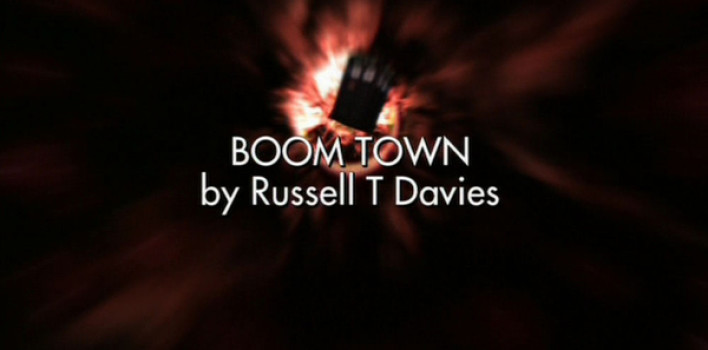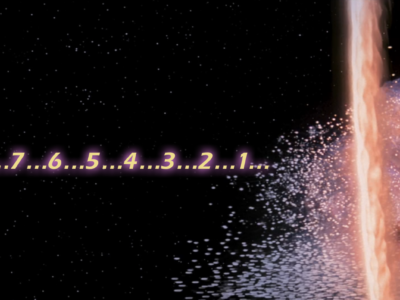Who-ology| S01E11 Boom Town
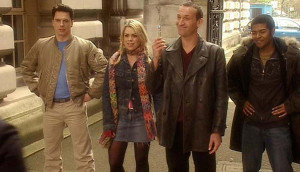 “Boom Town” starts right out of the gate with an airy, carefree, light-hearted tone. In the way, we enter the story in medias res with Rose, Jack, and the Doctor as they land in Cardiff. We watch them laugh at inside jokes and share stories of great adventures they’ve had that we haven’t witnessed. They are giddy with excitement, possibility, comradeship. While waiting for the TARDIS to “recharge,” soaking up the energy of the Rift (which harkens back to episode 3 and the Gelth), they meet up with Rose’s old flame Mickey Smith and kick back to share a meal and swap tales.
“Boom Town” starts right out of the gate with an airy, carefree, light-hearted tone. In the way, we enter the story in medias res with Rose, Jack, and the Doctor as they land in Cardiff. We watch them laugh at inside jokes and share stories of great adventures they’ve had that we haven’t witnessed. They are giddy with excitement, possibility, comradeship. While waiting for the TARDIS to “recharge,” soaking up the energy of the Rift (which harkens back to episode 3 and the Gelth), they meet up with Rose’s old flame Mickey Smith and kick back to share a meal and swap tales.
Unwittingly, they discover that an old enemy is alive and well and in town: Margaret Blaine (actually named Blon Fel-Fotch, a Slitheen they encountered in episodes 4 & 5). They chase her down and discover that she has a plan in progress that will get her off of Earth and destroy the planet in the process. The scheme itself sets the stakes but is not the focus of the episode. They snatch Margaret pretty early on (with little trouble) and keep her prisoner in the TARDIS until they are ready to take off and return her to her home planet. As Rose remarks enthusiastically, “We’ve got a prisoner. The police box is really a police box!” The tone shifts unexpectedly, darkening as Blon lets them in on a little secret: there’s an impending death warrant awaiting her back home.
Margaret: “You’re not just police, though. Since you’re taking me to my death, that makes you my executioners. Each and every one of you.”
Mickey: “Well, you deserve it.”
Margaret: “You’re very quick to say so. And you’re very quick to soak your hands in my blood. Which makes you better than me how, exactly?” [he says nothing] Long night ahead. Let’s see who can look me in the eye.
Our “heroes” try to pretend they are unaffected by this reality. They tell her (but really, they are telling themselves) that it doesn’t matter what happens to her after their self-assigned duty is done, and that she deserves it anyway. The more Margaret asks them to take responsibility for their actions, the more uncomfortable they show themselves to be. Eventually, they can’t even hold her gaze.
This episode plays a dirty trick on us viewers: It leads us to positively identify with familiar protagonists, then reverses the roles of hero and villain, effectively putting us in the “hot seat” to consider questions about morality, righteousness, and judgement. Davies turns an objectively evil villain into the sympathetic voice of righteous logic while putting our hero, the Doctor, under the microscope to show us a careless, heartless, self-righteous legacy of death we would never have associated with him.
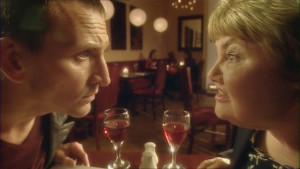 The Doctor doesn’t associate such things with himself either, and he reveals his hand to Margaret without even knowing it. He waxes poetic about how an evil person doesn’t deserve pardon just because they do one or two good deeds. Margaret condemns him by his own standard, and argues that it’s mercy, not worthiness, that grants forgiveness to offenders.
The Doctor doesn’t associate such things with himself either, and he reveals his hand to Margaret without even knowing it. He waxes poetic about how an evil person doesn’t deserve pardon just because they do one or two good deeds. Margaret condemns him by his own standard, and argues that it’s mercy, not worthiness, that grants forgiveness to offenders.
Margaret: “I spared her life.”
Doctor: “You let one of them go but that’s nothing new. Every now and then a little victim’s spared because she smiled, ’cause he’s got freckles. ‘Cause they begged. And that’s how you live with yourself. That’s how you slaughter millions. Because once in a while–on a whim, if the wind’s in the right direction–you happen to be kind.
Margaret: “Only a killer would know that. Is that right? From what I’ve seen, your funny little happy-go-lucky life leaves devastation in its wake. Always moving on because you dare not look back. Playing with so many people’s lives you might as well be a god. And you’re right, Doctor. You’re absolutely right. Sometimes you let one go. Let me go.”
What the story is saying is this: justice is not black and white. People are not all evil or all good. Because all human beings (and in this case, aliens) are a mix of both, it becomes gravely problematic when we are in a position of judging one another. The real question of “Boom Town” is not whether or not Margaret is a bad “person.” The real question is whether or not there is any one with the right to pass judgement on another. We have hitherto thought of the Doctor as such a person, but now see that he may have more in common with his villains than their victims.
What do we do when there is evil that needs to be stopped? How can there be justice if there is no one righteous enough to judge?
The ongoing dialogue between Margaret and the Doctor effectively causes paralysis—and in the midst of this “check mate” on the issue of judgement, Margaret gets Rose in her clutches, intent on destroying both her and the TARDIS in order to complete her plan. Then something happens. Margaret is judged.
Rose: “What’s that light?”
Doctor: “The heart of the TARDIS. This ship’s alive. You’ve opened its soul.”
Margaret: “It’s so bright.”
Doctor: “Look at it, Margaret.”
Margaret: “Beautiful.”
Doctor: “Look inside, Blon Fel-Fotch. Look at the light.”
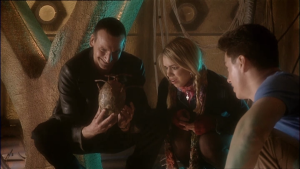 Judgement doesn’t come from the Doctor. He has been proven unworthy to pass sentence. It comes from the TARDIS, and the decision it comes to is not to set Margaret free nor to kill her. It turns her into an infant.
Judgement doesn’t come from the Doctor. He has been proven unworthy to pass sentence. It comes from the TARDIS, and the decision it comes to is not to set Margaret free nor to kill her. It turns her into an infant.
This turn of events is truly remarkable, and familiar to the Christian whose salvation experience is often equated with new birth. Through Jesus, we did not receive the death sentence that we deserve for our crimes against each other, our world, ourselves. Christ was the only one worthy to pass judgement, and yet he gave up his worthiness, passing it on to us and taking on our punishment in exchange.
Despite the dramatic tonal shift in “Boom Town,” we find ourselves arriving back at joy and happiness–this time in a deeper, more thoughtful sense. Our protagonists honor the TARDIS’ judgment call and return the infant Slitheen (now no longer Margaret nor Blon, but someone entirely new and unformed) to her home planet to start a new life. There is a chance that Margaret could choose the same path and end up in the same place, just as it is possible for God’s people to reject His gift of new life. What an act of surrender and trust for God to fully pardon people that may or may not honor His gift. Regardless of what we do with our sentence, God has offered us a new kind of pardon. It is one that offers mercy for what we’ve done before as well as makes provision for what we will inevitably do in the future. He took the first step of wild, crazy trust in the hope that such an undeserved act of grace would cause us to make new choices, to be born again and live in a new way.


